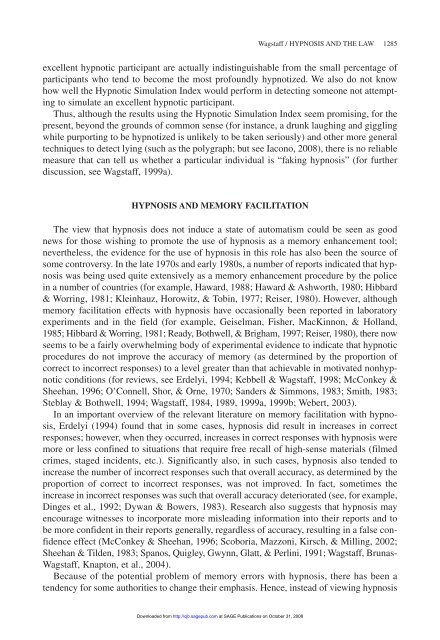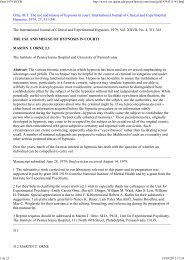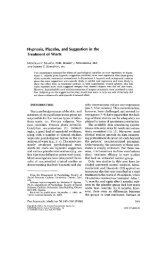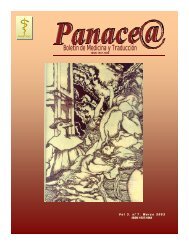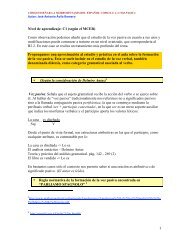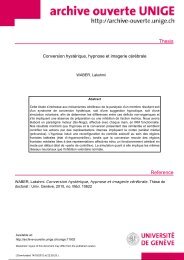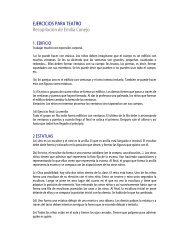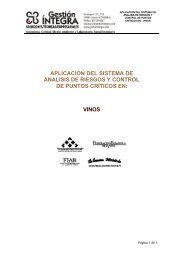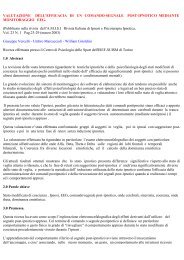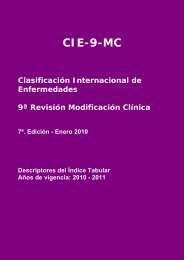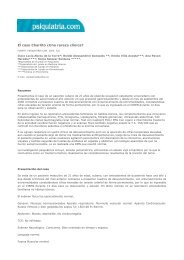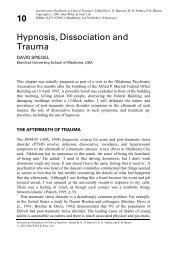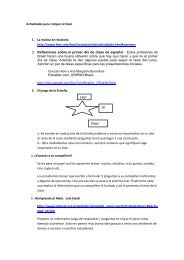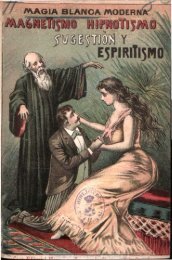Hypnosis and the Law: Examining the Stereotypes
Hypnosis and the Law: Examining the Stereotypes
Hypnosis and the Law: Examining the Stereotypes
Create successful ePaper yourself
Turn your PDF publications into a flip-book with our unique Google optimized e-Paper software.
excellent hypnotic participant are actually indistinguishable from <strong>the</strong> small percentage of<br />
participants who tend to become <strong>the</strong> most profoundly hypnotized. We also do not know<br />
how well <strong>the</strong> Hypnotic Simulation Index would perform in detecting someone not attempting<br />
to simulate an excellent hypnotic participant.<br />
Thus, although <strong>the</strong> results using <strong>the</strong> Hypnotic Simulation Index seem promising, for <strong>the</strong><br />
present, beyond <strong>the</strong> grounds of common sense (for instance, a drunk laughing <strong>and</strong> giggling<br />
while purporting to be hypnotized is unlikely to be taken seriously) <strong>and</strong> o<strong>the</strong>r more general<br />
techniques to detect lying (such as <strong>the</strong> polygraph; but see Iacono, 2008), <strong>the</strong>re is no reliable<br />
measure that can tell us whe<strong>the</strong>r a particular individual is “faking hypnosis” (for fur<strong>the</strong>r<br />
discussion, see Wagstaff, 1999a).<br />
HYPNOSIS AND MEMORY FACILITATION<br />
Wagstaff / HYPNOSIS AND THE LAW 1285<br />
The view that hypnosis does not induce a state of automatism could be seen as good<br />
news for those wishing to promote <strong>the</strong> use of hypnosis as a memory enhancement tool;<br />
never<strong>the</strong>less, <strong>the</strong> evidence for <strong>the</strong> use of hypnosis in this role has also been <strong>the</strong> source of<br />
some controversy. In <strong>the</strong> late 1970s <strong>and</strong> early 1980s, a number of reports indicated that hypnosis<br />
was being used quite extensively as a memory enhancement procedure by <strong>the</strong> police<br />
in a number of countries (for example, Haward, 1988; Haward & Ashworth, 1980; Hibbard<br />
& Worring, 1981; Kleinhauz, Horowitz, & Tobin, 1977; Reiser, 1980). However, although<br />
memory facilitation effects with hypnosis have occasionally been reported in laboratory<br />
experiments <strong>and</strong> in <strong>the</strong> field (for example, Geiselman, Fisher, MacKinnon, & Holl<strong>and</strong>,<br />
1985; Hibbard & Worring, 1981; Ready, Bothwell, & Brigham, 1997; Reiser, 1980), <strong>the</strong>re now<br />
seems to be a fairly overwhelming body of experimental evidence to indicate that hypnotic<br />
procedures do not improve <strong>the</strong> accuracy of memory (as determined by <strong>the</strong> proportion of<br />
correct to incorrect responses) to a level greater than that achievable in motivated nonhypnotic<br />
conditions (for reviews, see Erdelyi, 1994; Kebbell & Wagstaff, 1998; McConkey &<br />
Sheehan, 1996; O’Connell, Shor, & Orne, 1970; S<strong>and</strong>ers & Simmons, 1983; Smith, 1983;<br />
Steblay & Bothwell, 1994; Wagstaff, 1984, 1989, 1999a, 1999b; Webert, 2003).<br />
In an important overview of <strong>the</strong> relevant literature on memory facilitation with hypnosis,<br />
Erdelyi (1994) found that in some cases, hypnosis did result in increases in correct<br />
responses; however, when <strong>the</strong>y occurred, increases in correct responses with hypnosis were<br />
more or less confined to situations that require free recall of high-sense materials (filmed<br />
crimes, staged incidents, etc.). Significantly also, in such cases, hypnosis also tended to<br />
increase <strong>the</strong> number of incorrect responses such that overall accuracy, as determined by <strong>the</strong><br />
proportion of correct to incorrect responses, was not improved. In fact, sometimes <strong>the</strong><br />
increase in incorrect responses was such that overall accuracy deteriorated (see, for example,<br />
Dinges et al., 1992; Dywan & Bowers, 1983). Research also suggests that hypnosis may<br />
encourage witnesses to incorporate more misleading information into <strong>the</strong>ir reports <strong>and</strong> to<br />
be more confident in <strong>the</strong>ir reports generally, regardless of accuracy, resulting in a false confidence<br />
effect (McConkey & Sheehan, 1996; Scoboria, Mazzoni, Kirsch, & Milling, 2002;<br />
Sheehan & Tilden, 1983; Spanos, Quigley, Gwynn, Glatt, & Perlini, 1991; Wagstaff, Brunas-<br />
Wagstaff, Knapton, et al., 2004).<br />
Because of <strong>the</strong> potential problem of memory errors with hypnosis, <strong>the</strong>re has been a<br />
tendency for some authorities to change <strong>the</strong>ir emphasis. Hence, instead of viewing hypnosis<br />
Downloaded from<br />
http://cjb.sagepub.com at SAGE Publications on October 31, 2008


